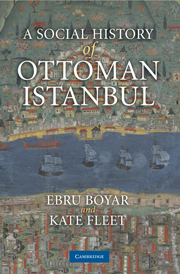Book contents
- Frontmatter
- Contents
- List of illustrations
- List of maps
- Acknowledgements
- Chronology
- Who's who
- Map 1 Istanbul and its environs
- Map 2 Locations within the city
- Introduction
- 1 Conquest
- 2 The palace and the populace
- 3 Fear and death
- 4 Welfare
- 5 The consuming city
- 6 Outings and excursions
- 7 The hamam
- 8 The nineteenth century
- Beyond the city
- Select bibliography
- Index
4 - Welfare
Published online by Cambridge University Press: 05 June 2012
- Frontmatter
- Contents
- List of illustrations
- List of maps
- Acknowledgements
- Chronology
- Who's who
- Map 1 Istanbul and its environs
- Map 2 Locations within the city
- Introduction
- 1 Conquest
- 2 The palace and the populace
- 3 Fear and death
- 4 Welfare
- 5 The consuming city
- 6 Outings and excursions
- 7 The hamam
- 8 The nineteenth century
- Beyond the city
- Select bibliography
- Index
Summary
One of the central institutions of Istanbul was the vakıf. Usually translated as ‘pious foundation’, this gives a somewhat misleading impression, for it conveys only one aspect of the organisation. Undoubtedly religious, it was also a quintessential system of welfare, used both to develop the economy of the city and to guarantee the material conditions and well-being of many of the city's inhabitants. It contained elements of prestige and display, and of protection of family wealth.
For many of the inhabitants of the city, it was a cradle-to-grave institution, for a man could be born in a vakıf house, sleep in a vakıf cradle, eat and drink from vakıf provisions, read in vakıf libraries, teach in a vakıf school, take his wage from the vakıf administration and, when he died, be put in a vakıf coffin and be buried in a vakıf graveyard. It was the vakıf institution that fed, educated, housed, washed and gave medical treatment to the population. It provided the people with a livelihood and rescued them in times of natural disaster. They went shopping in vakıf shops, they prayed in vakıf mosques; and the physical features of their city were to a very great extent shaped by the vakıf. In short, life in Istanbul without the vakıf institution was unthinkable.
A vakıf was an endowment, the income from which was allocated to charitable purposes.
- Type
- Chapter
- Information
- A Social History of Ottoman Istanbul , pp. 129 - 156Publisher: Cambridge University PressPrint publication year: 2010



